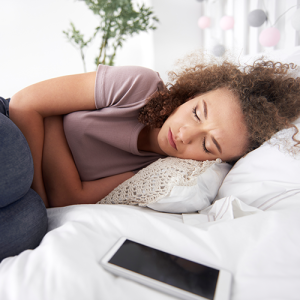Sometimes, tweens and teens feel embarrassed or awkward talking about their periods and the issues they may be dealing with related to their periods. But, we want to help with that.
It’s not unusual to have lots of questions about your period and the female reproductive system, and sometimes it can be hard to figure out what’s actually going on “down there.”
Because tweens and teens may feel uncomfortable talking about their period symptoms, they may not know what “normal” symptoms are.
They may wonder: How painful should a period really be? Are my symptoms, like my cramps, worse than my friends? What if I feel like I can’t go to school or my sport because the pain with my period is so bad?

One of the conditions that can cause painful periods is called endometriosis – a chronic condition that causes severe pelvic pain and painful periods.

One of our experts, Dr. Kate O’Flynn O’Brien, board certified obstetrician-gynecologist (OB-GYN) in our pediatric and adolescent gynecology department and the Adolescent and Young Adult (AYA) hematology and gynecology program, recently shared some helpful information about endometriosis.
What is endometriosis?
Endometriosis can affect anyone who gets a period. It’s caused when the lining of the uterus (called the endometrium) ends up outside of the uterus and inserts in places it should not be. When this gets inflamed or irritated, it can cause severe pain.
Up to 4 in 10 people who have painful periods may have endometriosis. Plus, endometriosis runs in families so if your mom or sister has the condition, other females in the family might have it, too.
Other related symptoms to endometriosis are:
- Migraine headaches.
- Anxiety and depression.
- Pain with peeing.
- Pain with having a bowel movement.
- Constipation or diarrhea.
Diagnosing and treating endometriosis
Developing a healthy, regular menstrual period is part of growing up. So, if something doesn’t seem right, including painful, heavy, frequent or irregular periods, it’s time to talk to your doctor.
Hormone medications
Typically, the first recommendation for irregular periods or suspected endometriosis are hormone medications. Often by regulating your hormones, your uncomfortable or painful symptoms will improve.
Patients who do not feel better with hormone medications may need surgery to confirm their endometriosis diagnosis.
Surgery
During the surgery, your provider will test samples from your abdomen and pelvis to see if you have endometriosis. After surgery, you’ll most likely continue hormone medications to keep the endometriosis symptoms at bay.
It’s important to treat endometriosis because if it is ignored, it can lead to problems like scarring or difficulty getting pregnant. Plus, you’ll feel a whole lot better if you do!
Other tips for period and pelvic pain relief
Whether you have endometriosis or premenstrual symptoms (PMS) such as cramps or headaches, you’ll likely be seeking pain relief, and fast. Here are some additional tips for managing pain:
- Pain medications like ibuprofen and naproxen are helpful in reducing pain symptoms.
- Some research has shown complementary medicine like acupuncture may provide relief for endometriosis patients.
- Moving your body through exercise like yoga or jogging has been shown to help pain related to periods.
- Heat wraps or packs have also been shown to provide some comforting relief.
It’s always a good idea to talk with your doctor to see what non-medication ways to treat endometriosis would be best for you.
Choose Children’s Minnesota for management of your child’s gynecologic health. Learn more about the pediatric and adolescent gynecology department.